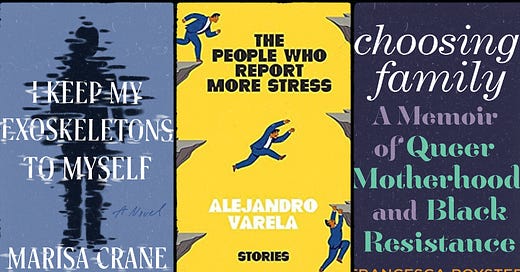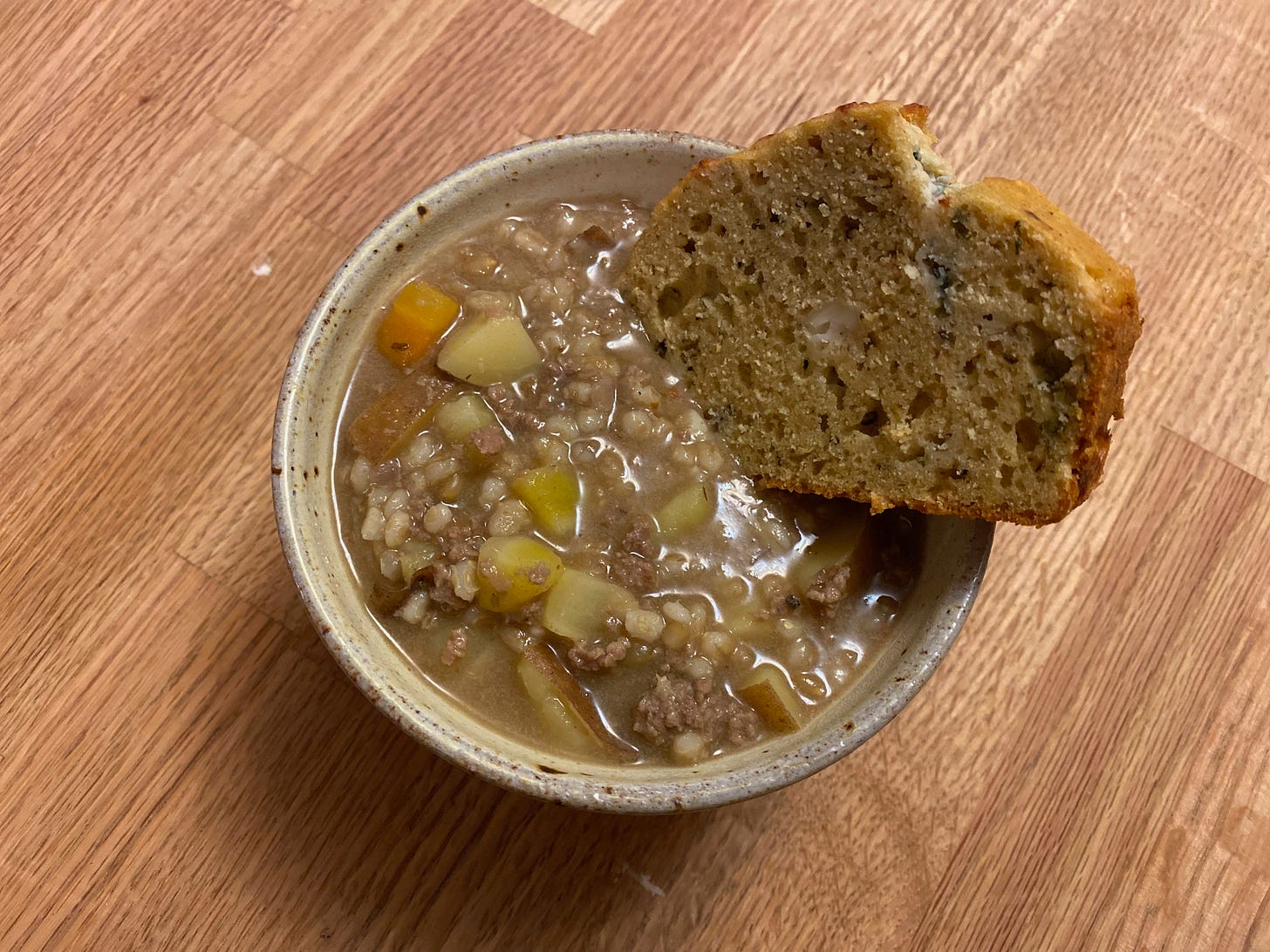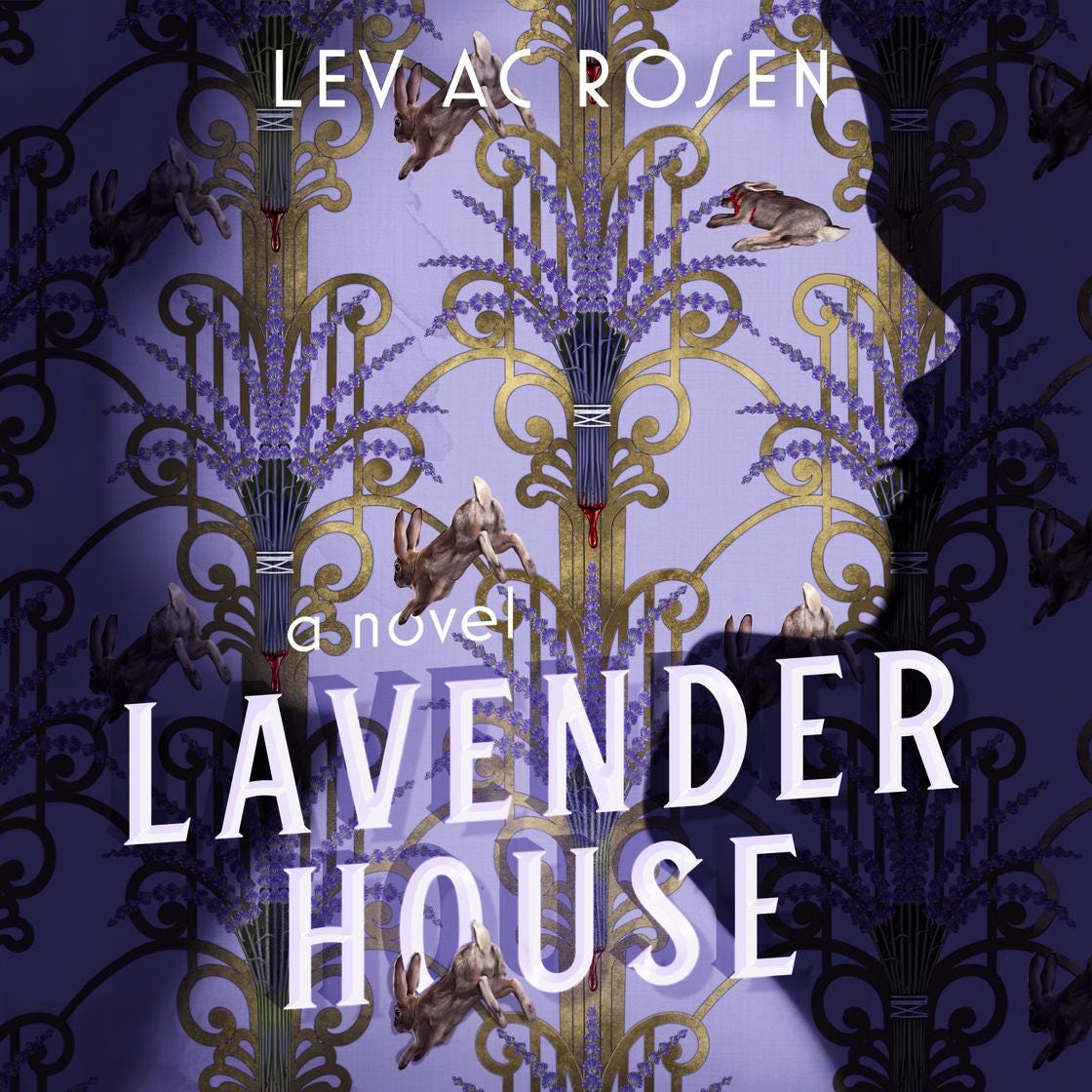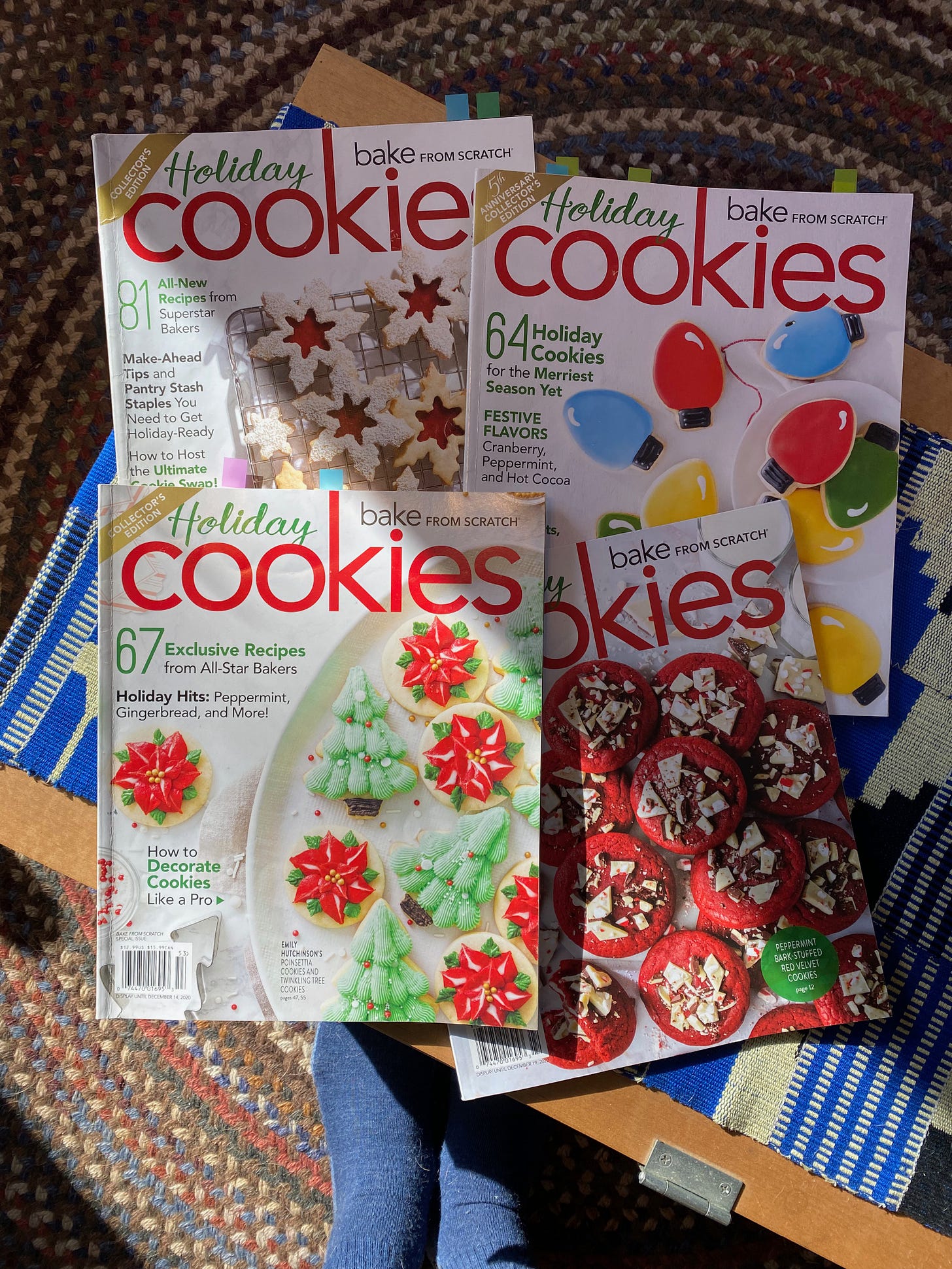Volume 2, No. 49: Get Your Queer Preorders On + Black Pepper & Blue Cheese Quick Bread
Greetings, book and treat people! Cookie Extravaganza has begun! I’m deep in my baking nest (i.e. my kitchen). Today’s baking plan includes apple cider caramels, world peace cookies, and pepperkaker (for starters).
This week’s Bookish Teatime video is all about rereads! I share some of the books that are currently at the top of my reread pile.
I haven’t reviewed that many upcoming books in the past two months. I got behind on my stack of ARCs and decided it was okay, because why put unnecessary pressure on myself? So today, as a treat, I have reviews of not one, not two, but three amazing queer books coming out in 2023! We all need something to look forward to. These books are something to look forward to. I love them all and I’ll be yelling about them for a while yet. So go get your preorders on and put in your library holds, because you’re not going to want to miss these books.
The Books
I Keep My Exoskeletons to Myself by Marisa Crane (Fiction, Catapult, January 17th)
Oh, wow. Where do I start with this one? I read it over the course of a weekend, in two thirsty swallows. I didn’t want to write about it immediately, I wanted to sit with it, let it sink into my pores a little more deeply. Now, weeks later, I’m sitting here at my dining room table, watching the chickadees and the woodpeckers at the feeder, thinking about the textures of ordinary life, the little unobserved moments that sometimes shapeshift into momentous ones, still trying to figure out what to say about this work and all the ways it has stitched itself to me.
At heart, this is a novel about community and personal accountability. It’s about how we forgive each other and how we forgive ourselves. It’s about the mechanics of making mistakes and atoning for them. It’s about how we enact punishment—not only how the state enacts punishment (which is nearly always simple and destructive) but how we enact punishment on ourselves and the people we love (which is nearly always complicated).
There are so many questions woven into the narrative of this book: What kind of environment does healing require? What do we owe the people we’ve wronged? What role does shame play in the way we relate to each other, to past versions of ourselves? How do we make amends? And, most chillingly, what happens when individuals, families, governments, and societies stop asking these questions? This terrifying, questionless place is where this book is set: in a United States that has replaced incarceration with public shaming, enforced by absolute state surveillance and a system of additional shadows. Wrongdoers are not sent to prison; instead, they’re given a second shadow, a reminder to them and everyone else of the crimes they’ve committed. Of course, this only exacerbates all of the existing systemic injustices. It’s bleak.
Kris is a grieving widow with a second shadow. Her wife dies just after giving birth to their daughter, who is immediately given an extra shadow of her own. Kris is trying to raise the kid alone in the midst of her grief. She has no idea what she’s doing. The descriptions of her early years of motherhood are messy and riotous. There is nothing safe or nice or tame about any of it. But slowly—so slowly—she and the kid find a precarious balance. Life goes on; the balance shatters. There’s something wonderfully cyclical about this novel—it has momentum, but it’s always looping back on itself, a beautiful blur of past and present and imagined future.
I could easily write a mini-essay on everything I love about this book. There’s the writing, which is alive and stark and searing. Kris narrates in the first person and her voice is so exact and so itself. I can still hear it in my head. There’s everything Crane has to say about queer family and queer parenthood—and it’s a lot. And there’s the creativity of the world-building, which doesn’t feel like world-building at all, because Kris’s emotional reality is so deeply, eerily, disturbingly familiar. Crane captures what it’s like to live through and in impossible times. The exhaustion. The moments where all the terrible stuff just disappears. The things humans can get used to, which is a lot, which is upsetting. The anger that builds and overflows. The cycle of hope and despair and hope and despair. The little moments of resistance that sometimes run together into powerful action, and sometimes don’t. The surprising shock of love despite it all. There is not a single character in this book who is good, who is moral, who is easy, who gets everything right. This, I think, is why it shook me so deeply. Everyone is complicit. No one is a monster.
I thought a lot about adrienne maree brown’s book We Will Not Cancel Us while I read this. The world of this novel is the opposite of the world brown imagines—it’s a world in which the differences between harm, abuse, conflict, critique, and disagreement have been erased. The consequences are devastating. But Kris and the kid and their small circle of queer friends and family are trying to do right by each other, anyway. They’re trying to live nuanced lives in a world that has made nuance illegal.
Choosing Family by Francesca Royster (Memoir, Abrams, February 7th)
This is a beautiful memoir about Black queer motherhood. It’s about the complexities of adoption and interracial partnership, about aging and grief, and about the ongoing work of, as the title states, choosing family. Choosing family, as Royster asserts over and over again, is a physical, emotional, spiritual, communal act. It doesn’t happen in a vacuum. It doesn’t happen only once. It’s ongoing. She writes, simply and beautifully, about this choosing, and the heartaches and joys that it has brought her.
This book is also about what it means to make a queer family, about the deep connections between queer and Black chosen and built families, and the lessons Royster has learned from both. In the first chapter, she describes her great-grandmother’s Chicago household like this: “To me, Cillie’s household reflected the spirit of queer family in the fluid shape of its membership and the permeability of its borders, stretching always in the face of political and economic troubles, as well as troubles of the heart.” She goes on to say, “My family was queer without ever claiming the word. That queerness has les to do with sex and more to do with loving—and creating, in spite of struggle.”
Near the end of the book, Royster offers a beautiful reflection on the years her mother spent volunteering at an AIDS hospice in Chicago and the profound effect it had on her mother’s life. She writes about learning lessons in queer family-making from her mother, even though the word “queer” went unspoken. This lineage runs deep through the whole memoir. Royster understands Black family and queer family as inextricably linked—not only in her home, her life, and her body—but in spirit and purpose and history. She offers so much big, generous wisdom about how Black and queer communities have gotten through and held each other up.
The memoir itself, beyond these wonderful explorations of family, is about how Royster became a mother. She and her white partner Annie decided to adopt a baby when she was in her early forties and Annie in her early fifties. She gets into the realities of parenting in her forties—both the challenges of parenting a young kid in an aging body, and the challenges of being an older parent in a world that assumes all parents should be young. I loved her honesty about this. It made me think a lot about my own relationship to parenthood and age.
I don’t want kids. I’m not conflicted about it. I’m also at an age—approaching my late thirties—that the world treats like a cutoff point for having children. As if, once I turn 40, that’s it, I had my chance. I’ve never bought into this idea, but this book made me realize all over again how narrow and confining it is. I don’t want kids, but I can imagine that maybe, at 46, I will want them. I saw a possible future for myself in this book. It’s not one that I want right now, but it’s one that I might want one day. That alone made me want to cry tears of joy while reading it. This is why we need all the motherhood and parenthood books. There are so few books about parents like Royster. There are so few books, frankly, about the parents that so many of us are or want to be. This book taught me so much. It smashed apart so many expectations and assumptions about family-making and motherhood that still live in my body, even though I’ve been working on expelling them for years. It opened me up to myself.
The People Who Report More Stress by Alejandro Varela (Short Stories, Astra House, April 4th)
You probably now by now how much I loved Varela’s debut The Town of Babylon, so I was very excited when I learned that his next book is coming out so soon! This is a collection of interconnected stories, mostly about queer Latinx immigrants and the children of immigrants, all set in New York City and the surrounding suburbs. At the center of the collection is an interracial gay couple, Gus and Eduardo. Varela returns to them over and over again, in different situations and in different times. What emerges is a wonderfully rich patchwork of all the hurts and messes and arguments and moments of tenderness that make up their life together (and apart).
I love short story collections that feel cohesive, that have some narrative tension, and this is one of those. Part of what makes it so compelling is the way Varela plays with time (which he also does brilliantly in The Town of Babylon). It’s not always obvious, in the first few pages, if a story is about Gus and Edwardo. And the stories that do center these characters are not told chronologically. In some stories they have kids and in others they don’t have kids yet. I was never quite sure where I was in their timeline. About halfway through, I started to wonder if the stories were in same timeline at all. Maybe, instead, this book is about a multitude of Guses and Eduardos, each story its own possibility model. There is, in fact, a story that addresses this idea directly, ‘Grand Openings’.
I never came to a definitive decision about it, and I don’t think it matters. Varela captures the feeling of moving through time so beautifully and so truthfully. And he captures moments so specifically: a man in his kitchen, drinking his morning tea before his family wakes up; two parents making small talk while their kids play; therapy sessions; an anxiety spiral on the subway; terrible first dates; a hospital room; a couple sitting on their stoop discussing the future of their relationship.
Something else I love about this book is the way it embraces sameness. I don’t mean that it’s boring or repetitive or that the characters are similar. It’s more that the book itself is concerned with certain issues, and these issues tumble through it ceaselessly. The characters think about and deal with them in different ways, but there’s a relentlessness to their presence. Varela does not allow you to stop thinking about public health and housing injustice and immigration and the politics and realities of being brown in academia. He does not allow you to stop thinking about racism and all the thousand thousand ways it manifests. He does not allow you to stop thinking about education and queer parenthood and all the choking ways patriarchy and white supremacy and heterosexism affect intimate relationships. Sometimes you really want to stop thinking about these things (as do some of the characters), but they can’t and you can’t. So there are all these stories, heartbreaking and funny and moving and tender, stories about falling in love, about breakups and work hookups and online dating, about families trying to get by and couples navigating non-monogamy, about illness and grief—and underneath the stories, there are the systemic injustices that define the world we live in. It’s so well done, and, despite the relentless reality, optimistic.
The Bake
Quick breads are magic! They aren’t yeasted breads—they’re not trying to be—but they’re delicious and so easy! I was in a bind the other day when I realized I didn’t have any bread in the house (a rare occurrence), and this bread came to the rescue. I ate it warm and buttered as a midmorning snack, and then made cheese toasties with it to go with soup for lunch. Perfection.
Black Pepper & Blue Cheese Quick Bread
Adapted from Baking with Dorie
Ingredients:
238 grams (1 3/4 cups) all-purpose flour
1 Tbs baking powder
1/2 tsp salt
1/2 tsp freshly ground black pepper (I used closer to a whole teaspoon)
3 eggs
1/3 cup (80 ml) milk
1/2 cup (80 ml) olive oil
1 Tbs honey
Grated zest of 1 lemon
4 ounces (113 grams) blue cheese (or soft goat cheese), cut into small pieces
3 Tbs chopped fresh herbs (I used thyme and mint)
Preheat the oven to 350. Butter an 8-inch loaf pan.
Combine the flour, baking powder, salt, and pepper in a large bowl. In a separate bowl, whisk together the eggs, milk, olive oil, honey, and lemon zest. Pour the wet ingredients into the dry and mix with a flexible spatula until just combined. Add the cheese and herbs and mix it all together with a few quick strokes. The dough will be wet and sticky; don’t overmix.
Turn the dough out into the prepared pan. Use a spatula to even out the top and nudge it into all the corners. Bake for 35-38 minutes, until the loaf is golden brown and risen, and a tester inserted in the center comes out clean. It might crack, like mine did! Let cool for a few minutes in the pan before turning it out and letting it cool the rest of the way on a wire rack. In a plastic bag, it’ll last for about a week, and it’s very good toasted.
The Bowl & The Beat
The Bowl: Lamb & Barley Stew
This is the kind of hearty, comforting food I crave this time of year. This recipe makes a big pot—I ate it for at least four lunches and froze two quarts. You can use smaller quantities if you don’t want lots of leftovers. A note: barley soaks up water as it sits, so this stew is very brothy on the first day, but loses most of its liquid content on the second day. If you want it soupier, just add more broth or water when you heat it up.
In a large pot, sauté 2 medium onions in olive oil. Add a few minced garlic cloves, a bay leaf or two, salt and pepper, and some oregano. Once the onions have softened, add two quarts of stock (any kind, and water is fine, too), a pound or so of chopped potatoes, 3-5 sliced carrots, 1.5 cups barley, and a pound of ground lamb. Stir and bring to a boil, then reduce the heat and let cook at a fast simmer for 45 minutes or so, until the barley is tender. You might need to add a little more water. You can add a splash of lemon juice and a spoonful of honey at the end, and top it with grated Parmesan. I was too hungry and did none of the above. It was still delicious.
The Beat: Lavender House by Lev AC Rosen, read by Vikas Adam
I loved everything about this historical mystery! I’m not a huge mystery reader, but I found the mystery here very satisfying—it doesn’t take over the plot, but it’s still engaging. It’s a book about a queer family, and I especially love that they all get to be petty and messy and dramatic. These are not good people, but they’re trying. It’s also about reinvention and reclamation and the costs of silence, and about what it means to build a utopia in a homophobic society—is it possible, is it even desirable. Vikas Adam is fantastic—he nails the low, growly voice of main character, a gay ex-cop. I listened to it on a long drive and missed my exit because I was so engrossed.
The Bookshelf
A Portal
Look, cookies are on my brain. I’m not much of a magazine reader, but I do love the Bake From Scratch annual cookie issues. I’ve found a few of my favorite recipes here, including two I make every year: stamped cardamom cookies and hot buttered rum rugelach. I don’t really need any more baking cookbooks or magazines, but if you have a favorite cookie recipe, or source for cookie recipes, of course I want to know about it!
A Bookish (or Baking) Quandary
I’ve run through my first batch of questions. Thanks to everyone who sent one in—it’s been a lot of fun to answer them! If you’ve got questions you’d like to see addressed in future newsletters, my inbox is open. Anything bookish or bake-ish is fair game! Send your questions to me at queerbooksandbakes@gmail.com, or just hit reply.
Around the Internet
I’m still thinking about all the ways book cataloging has improved my life! For Book Riot, I wrote about how it helped me slow down this fall.
Now Out / Can’t Wait!
Now Out
Holding Space by Ryan Pfluger (Princeton Architectural Press): I didn’t realize how much I love queer photo books until I read a few this year. Now I can’t get enough of them. Looking at beautiful photos of queer people living their lives is so celebratory and healing.
Can’t Wait
Sorry, Bro by Taleen Voskuni (Berkeley, January 31): I love a debut queer romance—I never know when a new romance writer might turn into another auto-buy author! This romcom about a bisexual Armenian American woman sounds great.
The Boost
I believe I mentioned this a few weeks ago, but it’s December now, and I’ve been flipping open one of the cards of this advent calendar every day. It is bringing me so much joy. December is already my favorite month, but this calendar is inspiring me to make even more space for rest and wonder and creativity. It’s astounding and glorious. There’s a digital edition, too.
As always, a little bit of beauty to send you on your way: It’s the Season of Light, and I’m celebrating.
I’ll be back in your inbox this Friday with another special edition—the best nonfiction I read this year. Catch you then!









